1869-1939 | 1940-1959 | 1960-1979 | 1980-1999 | 2000-present
1940
A six-team rival league, the third to call itself the American Football League, was formed, and the Columbus Bullies won its championship.
Halas's Bears, with additional coaching by Clark Shaughnessy of Stanford, defeated the Redskins 73-0 in the NFL Championship Game, December 8. The game, which was the most decisive victory in NFL history, popularized the Bears' T-formation with a man-in-motion. It was the first championship carried on network radio, broadcast by Red Barber to 120 stations of the Mutual Broadcasting System, which paid $2,500 for the rights.
Art Rooney sold the Pittsburgh franchise to Alexis Thompson, December 9, then bought part interest in the Philadelphia Eagles.
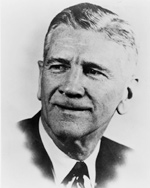
1941
Elmer Layden was named the first Commissioner of the NFL, March 1; Storck, the acting president, resigned, April 5. NFL headquarters were moved to Chicago.
Bell and Rooney traded the Eagles to Thompson for the Pirates, then re-named their new team the Steelers. Homer Marshman sold the Rams to Daniel F. Reeves and Fred Levy, Jr.
The league by-laws were revised to provide for playoffs in case there were ties in division races, and sudden-death overtimes in case a playoff game was tied after four quarters. An official NFL Record Manual was published for the first time.
Columbus again won the championship of the AFL, but the two-year-old league then folded.
The Bears and the Packers finished in a tie for the Western Division championship, setting up the first divisional playoff game in league history. The Bears won 33-14, then defeated the Giants 37-9 for the NFL championship, December 21.
1942
Players departing for service in World War II depleted the rosters of NFL teams. Halas left the Bears in midseason to join the Navy, and Luke Johnsos and Heartley (Hunk) Anderson served as co-coaches as the Bears went 11-0 in the regular season. The Redskins defeated the Bears 14-6 in the NFL Championship Game, December 13.
1943
The Cleveland Rams, with co-owners Reeves and Levy in the service, were granted permission to suspend operations for one season, April 6. Levy transferred his stock in the team to Reeves, April 16.
The NFL adopted free substitution, April 7. The league also made the wearing of helmets mandatory and approved a 10-game schedule for all teams.
Philadelphia and Pittsburgh were granted permission to merge for one season, June 19. The team, known as Phil-Pitt (and called the Steagles by fans), divided home games between the two cities, and Earle (Greasy) Neale of Philadelphia and Walt Kiesling of Pittsburgh served as co-coaches. The merger automatically dissolved the last day of the season, December 5.
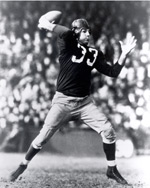
Ted Collins was granted a franchise for Boston, to become active in 1944.
Sammy Baugh won a "triple crown" in 1943
Sammy Baugh led the league in passing, punting, and interceptions. He led the Redskins to a tie with the Giants for the Eastern Division title, and then to a 28-0 victory in a divisional playoff game. The Bears beat the Redskins 41-21 in the NFL Championship Game, December 26.
1944
Collins, who had wanted a franchise in Yankee Stadium in New York, named his new team in Boston the Yanks. Cleveland resumed operations. The Brooklyn Dodgers changed their name to the Tigers.
Coaching from the bench was legalized, April 20.
The Cardinals and the Steelers were granted permission to merge for one year under the name Card-Pitt, April 21. Phil Handler of the Cardinals and Walt Kiesling of the Steelers served as co-coaches. The merger automatically dissolved the last day of the season, December 3.
In the NFL Championship Game, Green Bay defeated the New York Giants 14-7, December 17.
1945
The inbounds lines or hashmarks were moved from 15 yards away from the sidelines to nearer the center of the field-20 yards from the sidelines.
Brooklyn and Boston merged into a team that played home games in both cities and was known simply as The Yanks. The team was coached by former Boston head coach Herb Kopf. In December, the Brooklyn franchise withdrew from the NFL to join the new All-America Football Conference; all the players on its active and reserve lists were assigned to The Yanks, who once again became the Boston Yanks.
Halas rejoined the Bears late in the season after service with the U.S. Navy. Although Halas took over much of the coaching duties, Anderson and Johnsos remained the coaches of record throughout the season.
Steve Van Buren of Philadelphia led the NFL in rushing, kickoff returns, and scoring.
After the Japanese surrendered ending World War II, a count showed that the NFL service roster, limited to men who had played in league games, totaled 638, 21 of whom had died in action.
Rookie quarterback Bob Waterfield led Cleveland to a 15-14 victory over Washington in the NFL Championship Game, December 16.
1946
The contract of Commissioner Layden was not renewed, and Bert Bell, the co-owner of the Steelers, replaced him, January 11. Bell moved the league headquarters from Chicago to the Philadelphia suburb of Bala-Cynwyd.
Free substitution was withdrawn and substitutions were limited to no more than three men at a time. Forward passes were made automatically incomplete upon striking the goal posts, January 11.
The NFL took on a truly national appearance for the first time when Reeves was granted permission by the league to move his NFL champion Rams to Los Angeles.
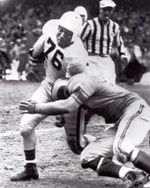
Halfback Kenny Washington (March 21) and end Woody Strode (May 7) signed with the Los Angeles Rams to become the first African-Americans to play in the NFL in the modern era. Guard Bill Willis (August 6) and running back Marion Motley (August 9) joined the AAFC with the Cleveland Browns.
The rival All-America Football Conference began play with eight teams. The Cleveland Browns, coached by Paul Brown, won the AAFC's first championship, defeating the New York Yankees 14-9.
Bill Dudley of the Steelers led the NFL in rushing, interceptions, and punt returns, and won the league's most valuable player award.
Backs Frank Filchock and Merle Hapes of the Giants were questioned about an attempt by a New York man to fix the championship game with the Bears. Bell suspended Hapes but allowed Filchock to play; he played well, but Chicago won 24-14, December 15.
1947
The NFL added a fifth official, the back judge.
A bonus choice was made for the first time in the NFL draft. One team each year would select the special choice before the first round began. The Chicago Bears won a lottery and the rights to the first choice and drafted back Bob Fenimore of Oklahoma A&M.
The Cleveland Browns again won the AAFC title, defeating the New York Yankees 14-3.
Charles Bidwill, Sr., owner of the Cardinals, died April 19, but his wife and sons retained ownership of the team. On December 28, the Cardinals won the NFL Championship Game 28-21 over the Philadelphia Eagles, who had beaten Pittsburgh 21-0 in a playoff.
1948
Plastic helmets were prohibited. A flexible artificial tee was permitted at the kickoff. Officials other than the referee were equipped with whistles, not horns, January 14.
Fred Mandel sold the Detroit Lions to a syndicate headed by D. Lyle Fife, January 15.
Halfback Fred Gehrke of the Los Angeles Rams painted horns on the Rams' helmets, the first modern helmet emblems in pro football.
The Cleveland Browns won their third straight championship in the AAFC, going 14-0 and then defeating the Buffalo Bills 49-7.
In a blizzard, the Eagles defeated the Cardinals 7-0 in the NFL Championship Game, December 19.
1949
Alexis Thompson sold the champion Eagles to a syndicate headed by James P. Clark, January 15. The Boston Yanks became the New York Bulldogs, sharing the Polo Grounds with the Giants. Free substitution was adopted for one year, January 20.
The NFL had two 1,000-yard rushers in the same season for the first time- Steve Van Buren of Philadelphia and Tony Canadeo of Green Bay.
The AAFC played its season with a one-division, seven-team format. On December 9, Bell announced a mer-ger agreement in which three AAFC franchises-Cleveland, San Francisco, and Baltimore-would join the NFL in 1950. The Browns won their fourth consecutive AAFC title, defeating the 49ers 21-7, December 11.
In a heavy rain, the Eagles defeated the Rams 14-0 in the NFL Championship Game, December 18.
1950
Unlimited free substitution was restored, opening the way for the era of two platoons and specialization in pro football, January 20.
Curly Lambeau, founder of the franchise and Green Bay's head coach since 1921, resigned under fire, February 1.
The name National Football League was restored after about three months as the National-American Football League. The American and National conferences were created to replace the Eastern and Western divisions, March 3.
The New York Bulldogs became the Yanks and divided the players of the former AAFC Yankees with the Giants. A special allocation draft was held in which the 13 teams drafted the remaining AAFC players, with special consideration for Baltimore, which received 15 choices compared to 10 for other teams.
The Los Angeles Rams became the first NFL team to have all of its games-both home and away-
televised. The Washington Redskins followed the Rams in arranging to televise their games; other teams made deals to put selected games on television.
In the first game of the season, former AAFC champion Cleveland defeated NFL champion Philadelphia 35-10. For the first time, deadlocks occurred in both conferences and playoffs were necessary. The Browns defeated the Giants in the American and the Rams defeated the Bears in the National. Cleveland defeated Los Angeles 30-28 in the NFL Championship Game, December 24.
1951
The Pro Bowl game, dormant since 1942, was revived under a new format matching the all-stars of each conference at the Los Angeles Memorial Coliseum. The American Conference defeated the National Conference 28-27, January 14.
Abraham Watner returned the Baltimore franchise and its player contracts back to the NFL for $50,000. Baltimore's former players were made available for drafting at the same time as college players, January 18.
A rule was passed that no tackle, guard, or center would be eligible to catch a forward pass, January 18.
The Rams reversed their television policy and televised only road games.
The NFL Championship Game was televised coast-to-coast for the first time, December 23. The DuMont Network paid $75,000 for the rights to the game, in which the Rams defeated the Browns 24-17.
1952
Ted Collins sold the New York Yanks' franchise back to the NFL, January 19. A new franchise was awarded to a group in Dallas after it purchased the assets of the Yanks, January 24. The new Texans went 1-11, with the owners turning the franchise back to the league in midseason. For the last five games of the season, the commissioner's office operated the Texans as a road team, using Hershey, Pennsylvania, as a home base. At the end of the season the franchise was canceled, the last time an NFL team failed.
The Pittsburgh Steelers abandoned the Single-Wing for the T-formation, the last pro team to do so.
The Detroit Lions won their first NFL championship in 17 years, defeating the Browns 17-7 in the title game, December 28.
1953
A Baltimore group headed by Carroll Rosenbloom was granted a franchise and was awarded the holdings of the defunct Dallas organization, January 23. The team, named the Colts, put together the largest trade in league history, acquiring 10 players from Cleveland in exchange for five.
The names of the American and National conferences were changed to the Eastern and Western conferences, January 24.
Jim Thorpe died, March 28.
Mickey McBride, founder of the Cleveland Browns, sold the franchise to a syndicate headed by Dave R. Jones, June 10.
The NFL policy of blacking out home games was upheld by Judge Allan K. Grim of the U.S. District Court in Philadelphia, November 12.
The Lions again defeated the Browns in the NFL Championship Game, winning 17-16, December 27.
1954
The Canadian Football League began a series of raids on NFL teams, signing quarterback Eddie LeBaron and defensive end Gene Brito of Washington and defensive tackle Arnie Weinmeister of the Giants, among others.
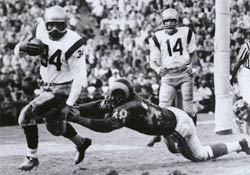
Fullback Joe Perry of the 49ers became the first player in league history to gain 1,000 yards rushing in consecutive seasons.
Cleveland defeated Detroit 56-10 in the NFL Championship Game, December 26.
1955
The sudden-death overtime rule was used for the first time in a pre-season game between the Rams and Giants at Portland, Oregon, August 28. The Rams won 23-17 three minutes into overtime.
A rule change declared the ball dead immediately if the ball carrier touched the ground with any part of his body except his hands or feet while in the grasp of an opponent.
The Baltimore Colts made an 80-cent phone call to Johnny Unitas and signed him as a free agent. Another quarterback, Otto Graham, played his last game as the Browns defeated the Rams 38-14 in the NFL Championship Game, December 26. Graham had quarterbacked the Browns to 10 championship-game appearances in 10 years.
NBC replaced DuMont as the network for the title game, paying a rights fee of $100,000.
1956
The NFL Players Association was founded.
Grabbing an opponent's facemask (other than the ball carrier) was made illegal. Using radio receivers to communicate with players on the field was prohibited. A natural leather ball with white end stripes replaced the white ball with black stripes for night games.
The Giants moved from the Polo Grounds to Yankee Stadium.
Halas retired as coach of the Bears, and was replaced by Paddy Driscoll.
CBS became the first network to broadcast some NFL regular-season games to selected television markets across the nation.
The Giants routed the Bears 47-7 in the NFL Championship Game, December 30.
1957
Pete Rozelle was named general manager of the Rams. Anthony J. Morabito, founder and co-owner of the 49ers, died of a heart attack during a game against the Bears at Kezar Stadium, October 28. An NFL-record crowd of 102,368 saw the 49ers-Rams game at the Los Angeles Memorial Coliseum, November 10.
The Lions came from 20 points down to post a 31-27 playoff victory over the 49ers, December 22. Detroit defeated Cleveland 59-14 in the NFL Championship Game, December 29.
1958
The bonus selection in the draft was eliminated, January 29. The last selection was quarterback King Hill of Rice by the Chicago Cardinals.
Halas reinstated himself as coach of the Bears.
Jim Brown of Cleveland gained an NFL-record 1,527 yards rushing. In a divisional playoff game, the Giants held Brown to eight yards and defeated Cleveland 10-0.
Baltimore, coached by Weeb Ewbank, defeated the Giants 23-17 in the first sudden-death overtime in an NFL Championship Game, December 28. The game ended when Colts fullback Alan Ameche scored on a one-yard touchdown run after 8:15 of overtime.
1959
Vince Lombardi was named head coach of the Green Bay Packers, January 28. Tim Mara, the co-founder of the Giants, died, February 17.
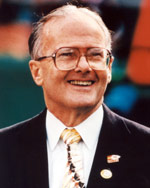
Lamar Hunt of Dallas announced his intentions to form a second pro football league. The first meeting was held in Chicago, August 14, and consisted of Hunt representing Dallas; Bob Howsam, Denver; K.S. (Bud) Adams, Houston; Barron Hilton, Los Angeles; Max Winter and Bill Boyer, Minneapolis; and Harry Wismer, New York City. They made plans to begin play in 1960.
The new league was named the American Football League, August 22. Buffalo, owned by Ralph Wilson, became the seventh franchise, October 28. Boston, owned by William H. Sullivan, became the eighth team, November 22. The first AFL draft, lasting 33 rounds, was held, November 22. Joe Foss was named AFL Commissioner, November 30. An additional draft of 20 rounds was held by the AFL, December 2.
NFL Commissioner Bert Bell died of a heart attack suffered at Franklin Field, Philadelphia, during the last two minutes of a game between the Eagles and the Steelers, October 11. Treasurer Austin Gunsel was named president in the office of the commissioner, October 14.
The Colts again defeated the Giants in the NFL Championship Game, 31-16, December 27.